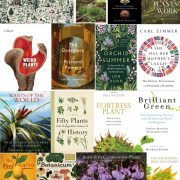Book Recommendations – Other
A list of book recommendations from our community that are not directly related to plant science, but are still good reads
“I’d recommend scientists to get out of the wormhole and read something else… Something historical, philosophical, or something as far removed from science as is possible. Something beautifully written that might end up with science papers that are bearable to read in return”- @Juggling_Doctor
“Read something separate unrelated (fiction). Mental space so important!” – @lecaDB
Science/Philosophy
Power, Sex, Suicide: Mitochondria and the Meaning of Life by Nick Lane (2006)
In this fascinating and thought-provoking book, Nick Lane brings together the latest research in this exciting field to show how our growing insight into mitochondria has shed light on how complex life evolved, why sex arose (why don’t we just bud?), and why we age and die. – Goodreads
/preview.png)
The Sixth Extinction: An Unnatural History by Elizabeth Kolbert (2014)
In prose that is at once frank, entertaining, and deeply informed, The New Yorker writer Elizabeth Kolbert tells us why and how human beings have altered life on the planet in a way no species has before. – Goodreads
/preview.png)
Rules for the Direction of the Mind by René Descartes, Laurence J. Lafleur (1961)
Rene Descartes discusses the basic rules he has devised to guide human thought toward better knowledge.
/preview.png)
Tree of Knowledge by Humberto R. Maturana, Francisco J. Varela (1992)
“Knowing how we know” is the subject of this book. Its authors present a new view of cognition that has important social and ethical implications, for, they assert, the only world we humans can have is the one we create together through the actions of our coexistence.- Goodreads
/preview.png)
The Fabric of Reality: The Science of Parallel Universes–and Its Implications by David Deutsch (1996)
The Fabric of Reality explains and connects many topics at the leading edge of current research and thinking, such as quantum computers (which work by effectively collaborating with their counterparts in other universes), the physics of time travel, the comprehensibility of nature and the physical limits of virtual reality, the significance of human life, and the ultimate fate of the universe. – Goodreads
/preview.png)
The Tyranny of Science by Paul Karl Feyerabend (2011)
In this book Paul Feyerabend masterfully weaves together the main elements of his mature philosophy into a gripping tale: the story of the rise of rationalism in Ancient Greece that eventually led to the entrenchment of a mythical scientific worldview’.- Goodreads
/preview.png)
The Meaning of Science by Tim Lewens (2015)
In The Meaning of Science, Tim Lewens offers a provocative introduction to the philosophy of science, showing us for example what physics teaches us about reality, what biology teaches us about human nature, and what cognitive science teaches us about human freedom.- Goodreads
/preview.png)
The Rightful Place of Science: Science on the Verge by Andrea Saltelli, Alice Benessia, Silvio Funtowicz 2016
Not to be missed by any Career Scientists. “Every producer, consumer, and believer of ‘science’ should read this book.” … “Read it and weep. And commit to doing better.” – @philipbstark
/preview.png)
Packing for Mars by Mary Roach (2010)
“She covers what the breadth of research and experimentation that is required to get humans to Mars in the future, which often results in rethinking the technology about basic human processes. There isn’t a ton about plant science research, but it is a really good example of science writing that can keep an audience engaged long-term, whether through oddities or humor.” – @NMadonich
/preview.png)
Parasite Rex: Inside the Bizarre World of Nature’s Most Dangerous Creatures by Carl Zimmer (2014)
Carl Zimmer takes us on a fantastic voyage into the secret parasite universe we actually live in but haven’t recognized. He reveals not only that parasites are the most successful life-forms on Earth, but that they triggered the development of sex, shape ecosystems, and have driven the engine of evolution. – Goodreads
/preview.png)
The Coming Plague: Newly Emerging Diseases in a World Out of Balance by Laurie Garrett (1995)
“Very fine accounts of emerging diseases and public health crises.” @edrybicki
/preview.png)
Weapons of Math Destruction: How Big Data Increases Inequality and Threatens Democracy by Cathy O’Neil (2016)
“It’s all about inbuilt biases in current machine learning and big data systems, how they’re perpetuated by the same systems, and what we could possibly do against that.” – @PhilippBayer
/preview.png)
Historical Perspectives
Maker of Patterns: An Autobiography Through Letters by Freeman Dyson (2018)
“It’s letters from the 30s to the 60s he sent to his family detailing his life at the cutting edge of physics, very interesting, astute, but probably not so useful for current scientists looking for advice as that particular gold rush is over. There are a few collections of Dyson’s essays he wrote for NYRB, you can’t go wrong with those either.” – @PhilippBayer
/preview.png)
The Structure of Scientific Revolutions by Thomas S. Kuhn (1996)
“It made me think a lot about how to approach things differently if possible” – @LarryMattYork
“This book was great though a challenging read.” – @atomadam2
/preview.png)
The Voyage of the Beagle by Charles Darwin (1839)
The Voyage of the Beagle is the title most commonly given to the book written by Charles Darwin and published in 1839 as his Journal and Remarks.
/preview.png)
Apes, Angels and Victorians by William Irvine (1983)
Two excellent biographies in one volume: Darwin and Huxley, and their achievements during the middle of the 19th century. The book also concentrates on two major themes of both men: science and theology.
/preview.png)
Microbe Hunters by Paul de Kruif (2002)
Paul de Kruif’s Microbe Hunters is a timeless dramatization of the scientists, bacteriologists, doctors, and medical technicians who discovered microbes and invented the vaccines to counter them. – Goodreads
/preview.png)
The Alchemy of Air: A Jewish Genius, a Doomed Tycoon, and the Scientific Discovery That Fed the World but Fueled the Rise of Hitler by Thomas Hager (2008)
The Alchemy of Air is the extraordinary, previously untold story of two master scientists who saved the world only to lose everything and of the unforseen results of a discovery that continues to shape our lives in the most fundamental and dramatic of ways. – Goodreads
/preview.png)
Galileo’s Middle Finger: Heretics, Activists, and the Search for Justice in Science by Alice Domurat Dreger (2015)
“Great as an example of how to act both ethically and courageously” – @nycticebus
/preview.png)
Vanished Kingdoms: The History of Half-Forgotten Europe by Norman Davies (2011)
“A collection of essays around these small kingdoms and countries in history that were swallowed up by other countries, and no modern person claims heritage from. Incredibly interesting how much history can ignore, and how imaginary borders are. ” @PhilippBayer
/preview.png)
Inferior: How Science Got Women Wrong—and the New Research That’s Rewriting the Story by Angela Saini (2017)
“Inferior by Angela Saini has been an eye opening read for me, I’ve been sharing it with everyone. It looks into how science contributed to gender inequality and what research is being done now to fix it.” – @AY_Leary
/preview.png)
What Mad Pursuit by Francis Crick (1990)
Candid, provocative, and disarming, this is the widely-praised memoir of the co-discoverer of the double helix of DNA. – Goodreads
/preview.png)
The Origin of Species by Charles Darwin (1858)
Written for the general reader, in a style which combines the rigour of science with the subtlety of literature, The Origin of Species remains one of the founding documents of the modern age. – Goodreads
/preview.png)
The Malay Archipelago by Alfred Russel Wallace (1869)
A work of astounding scope and originality that provides some of the first evidence of the modern theory of evolution. Wallace, a contemporary of Charles Darwin, spent nearly a decade cataloging the plant and animal species that inhabited the unique geographical area of the Malay Archipelago, and remains to this day one of the most extensive works of natural history ever written.- Goodreads
/preview.png)
The Invention of Nature: Alexander von Humboldt’s New World by Andrea Wulf (2015)
“Great book that provides a historical perspective on issues that are critical in our world today, like climate change, for instance.” – @lixiari
/preview.png)
Cantor’s Dilemma by Carl Djerassi (1989)
When Professor Isidore Cantor reveals his latest breakthrough in cancer research, the scientific community is galvanized. Cantor’s most promising research fellow, Dr. Jeremiah Stafford, has only to conduct the experiment that will prove the brilliant hypothesis and win cantor the Nobel Prize. But how far will the young assistant go to guarantee the results? – Goodreads
/preview.png)
The Vital Question: Energy, Evolution, and the Origins of Complex Life by Nick Lane (2016)
“Like his other books this one focuses on mitochondria and energy pathways, he presents a highly engaging hypothesis on how complex life was made possible.”- @PhilippBayer
/preview.png)
Memoirs/Biography
Feynman’s Rainbow: A Search for Beauty in Physics and in Life by Leonard Mlodinow (2004)
“autobiography of his early career in physics, a highly promising PhD thesis followed by a ‘do whatever you want, you have free rein’ position, including a huge case of impostor syndrome. Good if you don’t want to feel alone as an ECR… ” – @PhilippBayer
/preview.png)
Surely You’re Joking, Mr. Feynman!: Adventures of a Curious Character by Richard Feynman (1997)
In short, here is Feynman’s life in all its eccentric glory – a combustible mixture of high intelligence, unlimited curiosity, and raging chutzpah. – Goodreads
/preview.png)
My Life in Science (Lives in Science) by Sydney Brenner (2001)
This entertaining account charts Brenner’s life, in his own words, from early experiments in the back room of his father’s shoe shop to his election as Director of the MRC Laboratory of Molecular Biology in Cambridge, UK and beyond. – Goodreads
/preview.png)
Physics and Philosophy: The Revolution in Modern Science by Werner Heisenberg (2000)
Nobel Prize winner Werner Heisenberg’s classic account explains the central ideas of the quantum revolution, and his celebrated Uncertainty Principle. – Goodreads
/preview.png)
My View of the World by Erwin Schrödinger (1983)
A Nobel prize winner, a great man and a great scientist, Erwin Schrödinger has made his mark in physics, but his eye scans a far wider horizon: here are two stimulating and discursive essays which summarize his philosophical views on the nature of the world. – Goodreads
/preview.png)
Letters to a Young Scientist by Edward O. Wilson (2013)
Inspired by Rainer Maria Rilke’s Letters to a Young Poet, Edward O. Wilson has distilled sixty years of teaching into a book for students, young and old. – Goodreads
/preview.png)
Neanderthal Man: In Search of Lost Genomes by Svante Pääbo (2014)
A riveting story about a visionary researcher and the nature of scientific inquiry, Neanderthal Man offers rich insight into the fundamental question of who we are. – Goodreads
/preview.png)
For the Love of Enzymes: The Odyssey of a Biochemist by Arthur Kornberg (1991)
Arthur Kornberg’s book is a modern-day Book of Five Rings that replaces the medium of swordsmanship with that of biochemistry, particularly enzymology. – Goodreads
/preview.png)
Our Lives: Encounters of a Scientist by Istvban Hargittai (2004)
/preview.png)
Fiction
The Street of Crocodiles Bruno Schulz (1992)
“One of my favourite novels, it’s a treat.” – @PhilippBayer
/preview.png)
T.C. Boyle Fiction
“Rather than share one book, I’d like to review one of my favorite novelists, T.C. Boyle, who writes novels and short stories.. I’ve read most of his books and many of his short story anthologies and have enjoyed them all. His characters are interesting and complex, and his situations unusual. Many of his books are fictionalized accounts of real historical people, from Mungo Park to Kellogg (of the breakfast cereal) to Frank Lloyd Wright. Others touch on current events from immigration to gun violence. He’s genuinely funny, but these aren’t comic novels per se – the humor is woven into excellent, thought-provoking story lines. One of the things I most like about his writing is his attention to detail – he is one of the few novelists I’ve read who, when setting a scene, names the plants in it! He’s also known for his broad vocabulary (I use the dictionary function on my kindle regularly) – yet for some reason, possibly due to the ornateness of his writing in general, these distinctive word choices don’t come across as pretentious. If you’d like to check out his writing, one of my favorite novels is Water Music (also the first that I read), about the exploration of the Niger River. I also like Tortilla Curtain (challenging subject matter, though) and East is East (quite funny). For short story collections, Greasy Lake and After the Plague are both quite good.” –@PlantTeaching
/preview.png)
Lincoln in the Bardo by George Saunders (2017)
“To inspire out-of-the-box-thinking, creativity and necessary relaxation I would suggest this one.” – @Team_Thomma
/preview.png)










Leave a Reply
Want to join the discussion?Feel free to contribute!